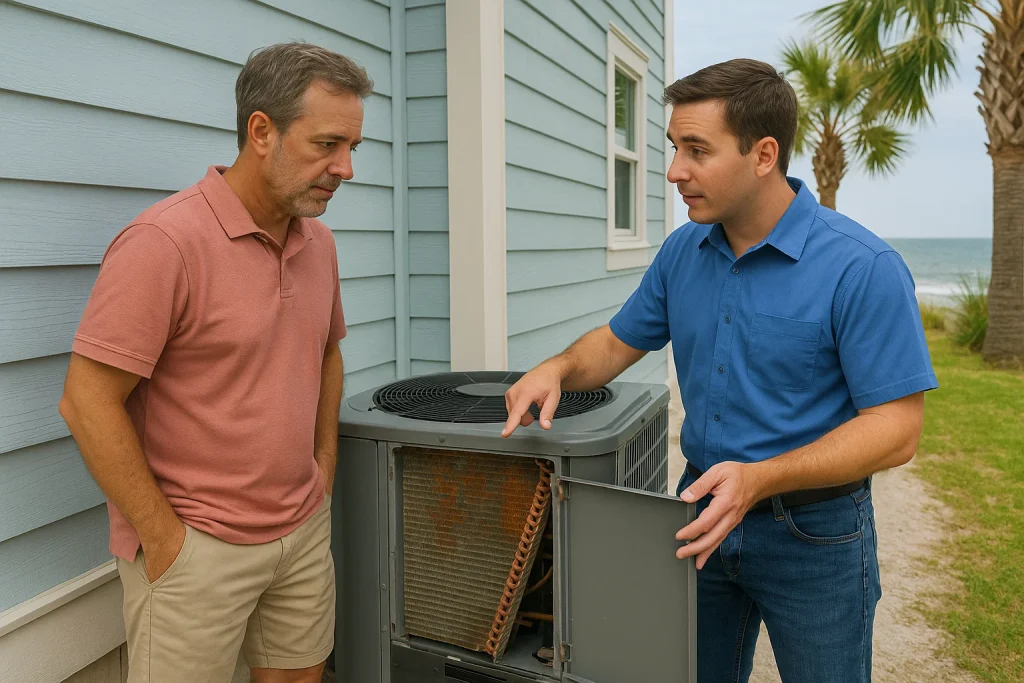Living in Wilmington has its perks—beautiful beaches, ocean breezes, and mild winters—but coastal living can take a toll on more than just your car or patio furniture. One of the most overlooked victims of salt air and coastal humidity? Your HVAC system.
As your trusted local HVAC professionals, we’ve seen firsthand how the coastal environment accelerates wear and tear on air conditioners and heat pumps in the Wilmington area. Fortunately, with the right care and maintenance, you can protect your system and keep it running efficiently for years to come.

The Coastal Climate Challenge
Wilmington’s proximity to the Atlantic Ocean means your HVAC system is constantly exposed to salt-laden air, high humidity, and frequent storms.
1. Salt Air = Accelerated Corrosion
Salt particles in the air settle on the outdoor unit—especially on the condenser coil and metal casing. Over time, this leads to:
- Corrosion of the coil fins
- Rusting of electrical components
- Reduced system lifespan
If left unchecked, corrosion can impact the efficiency of heat transfer, causing your system to work harder and wear out faster.
2. High Humidity = Mold & Moisture Damage
Humidity levels in coastal regions like Wilmington are typically high year-round. Excess humidity can lead to:
- Mold growth inside ductwork and air handlers
- Water buildup in drain pans and lines
- Musty indoor odors
- Decreased indoor air quality
Your HVAC system plays a key role in dehumidifying your home, but too much moisture puts additional strain on the system—and can lead to breakdowns if not addressed.
3. Storm Exposure = Wear and Tear
Coastal storms bring wind, rain, debris, and power fluctuations—all of which can damage your HVAC system’s outdoor components and compromise performance over time.
What You Can Do to Protect Your HVAC System
The good news? You can absolutely enjoy life by the coast and protect your HVAC investment with proactive maintenance and smart upgrades. Here’s what we recommend for Wilmington homeowners:
- Schedule regular coil cleaning – Salt and sand buildup on the condenser coils restrict airflow and reduce system efficiency. We recommend professional coil cleaning at least once a year, especially after spring and summer, when salt exposure is at its highest.
- Apply anti-corrosion coatings – Talk to your technician about applying a protective coating to your outdoor unit’s coils and components. This barrier helps slow down corrosion caused by salt exposure and adds an extra layer of defense against the coastal elements.
- Check and clear the condensate drain line – Humidity causes your system to produce more condensation. If the drain line clogs, water can back up and cause indoor water damage or shut your system off completely. During a maintenance visit, we’ll flush the line and check for blockages.
- Invest in routine inspections – Semi-annual HVAC inspections (spring and fall) are especially important near the coast. We’ll inspect electrical connections, look for corrosion, test refrigerant levels, and catch problems early—before salt and humidity do more damage.
- Consider coastal-rated equipment – If you’re installing a new system, ask us about coastal-grade HVAC units. These are designed with corrosion-resistant materials and factory-applied coatings to better withstand Wilmington’s harsh climate.
At Gideon Heating & Air Conditioning, we like to say that our work isn’t just good—it’s Gideon Guaranteed! Contact us today to schedule HVAC services.
